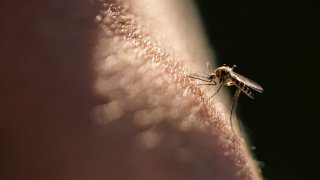
The Illinois Department of Health on Thursday reported that at least seven counties in the state have reported positive cases of West Nile virus in mosquitoes.
The first mosquitoes to test positive for West Nile virus in Illinois in 2022 were reported in May, in Roselle in DuPage County.
Now, the virus has been confirmed in mosquitoes in six more counties: Cook, Will, Logan, Edgar, Macoupin and Washington, the IDPH says.
While no human cases have been reported in Illinois this year, there were 64 human cases reported in 2021, with five deaths attributed to the disease.
Feeling out of the loop? We'll catch you up on the Chicago news you need to know. Sign up for the weekly Chicago Catch-Up newsletter here.
“West Nile virus is a serious illness, and we want to remind everyone to protect themselves from mosquito bites at this time of year when so many of us are spending more time outdoors,” said IDPH Acting Director Amaal Tokars.
“The most important things we can do are to wear insect repellent if we are spending time outside and eliminate standing water where mosquitos breed around our homes."
According to the state health department, West Nile virus is transmitted through the bite of a Culex pipiens mosquito, commonly called a house mosquito, that has picked up the virus by feeding on an infected bird.
Local
Common symptoms of West Nile in humans include fever, nausea, headache and muscle aches, with symptoms lasting from a few days to a few weeks.
"However, four out of five people infected with West Nile virus will not show any symptoms," public health officials stated in a release.
"In rare cases, severe illness including meningitis, encephalitis, or even death, can occur."
People older than 60 and individuals with weakened immune systems are at higher risk for severe illness from West Nile virus.
Here are a few tips the IDPH offers to help remain safe from West Nile:
- Make sure doors and windows have tight-fitting screens. Repair or replace screens that have tears or other openings. Try to keep doors and windows shut.
- Eliminate, or refresh each week, all sources of standing water where mosquitoes can breed, including water in bird baths, ponds, flowerpots, wading pools, old tires, and any other containers.
- When outdoors, wear shoes and socks, long pants and a light-colored, long-sleeved shirt, and apply an EPA-registered insect repellent that contains DEET, picaridin, oil of lemon eucalyptus, or IR 3535 according to label instructions. Consult a physician before using repellents on infants.
- Report locations where you see water sitting stagnant for more than a week such as roadside ditches, flooded yards, and similar locations that may produce mosquitoes. The local health department or city government may be able to add larvicide to the water, which will kill any mosquito larvae.
Updates on where cases have been reported can be found on the IDPH West Nile Virus Surveillance page.



